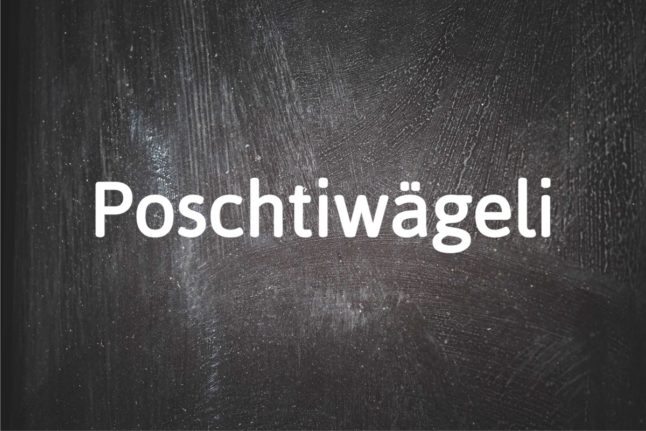Referred to locals as Dialäkt, Mundart or just Düütsch, the Swiss spin on standard German gives rise to many wonderful phrases.
Here are a few of them.
And a note before this list begins: these sayings are meant to read with standard German pronunciation.
Swiss German is primarily a spoken language, therefore, grammar rules are much more relaxed in regard to spelling, capitalisation and the use of articles.
All grammar here is the close approximation of a native speaker, Google Translate and her family’s patient Whatsapp feedback.
1. “Chasch nöd der Füfer und s Weggli ha”
This translates roughly to the English saying “You can’t have your cake and eat it too.”
However, the two objects in question are a “Füfer,” the Swiss German word for the five-Franc coin, and a “Weggli,” a bread roll made with milk.
 A stack of Swiss “Füfer” coins next to some Euros. Photo: DPA
A stack of Swiss “Füfer” coins next to some Euros. Photo: DPA
Swiss German isn’t strict about the infamous German particles of “Der,” “Die” and “Das,” so feel free to call it “en Füfer.” And as you can see with “Weggli,” the article “Das” is missing entirely, replaced with just an “S.”
Alas, in life, one must choose between an extra five bucks or a lovely buttered snack. A good saying to keep in mind.
2. “De Schneller isch der Gschwinder”
The English equivalent to this phrase would be “It is the way it is.” Literally translated, the phrase means “The faster man is quicker.”
Once again, you can see that the articles are different between “Schneller” and “Gschwinder.” As in the Weggli example with “Das” becoming “S,” “Der” and “Die” can often just be replaced with the letters “De.”
This redundant saying serves only to illustrate that some things just are the way they are.
3. “Rüebli git schöni Büebli”
This saying is simple: “Carrots make beautiful boys.” Boys are “Büebli” and carrots are “Rüebli” in Swiss German. The phrase is sometimes said to children to encourage them to eat vegetables, or to expectant mothers.
However, this goofy saying may have a scientific basis: Beta carotene is the red-orange pigment found in certain plants including carrots.
The human body converts beta carotene into vitamin A, which is important for healthy vision, skin, mucous membranes as well as the immune system.
Pregnant women also need the vitamin because it is important for normal foetal development.
 It’s not clear whether this “Rüebli” saying was meant to encourage children to eat their vegetables, or if it was simply a play on words. Photo: DPA
It’s not clear whether this “Rüebli” saying was meant to encourage children to eat their vegetables, or if it was simply a play on words. Photo: DPA
But then again, maybe this saying just exists just because “Rüebli” and “Büebli” rhyme so well.
Additionally, for the second time in this list, we encounter the suffix “Li.” Swiss German is famous for this add-on, their equivalent of the standard German “Chen” to make something smaller and cuter. It’s a staple just as much as the hard “ch” sound in “Chuchichästli.”
4. “Gömmer eis go zieh?”
In standard German, this phrase would be “Gehen wir eins Ziehen?” In English: “Should we go pull one?” As you’ve probably noticed, this makes absolutely no sense in either language.
However, in Swiss German, when friends are headed out to get a drink they often call it “eins zieh” or “pulling one.”
You’ll hear this phrase often amongst friends headed to a local bar or restaurant.
5. “sLäbe isch kein Sugus.”
“Das Leben ist kein Sugus,” would be the standard German translation, meaning “Life is not a Sugus.”
We must now introduce “Sugus,” a famous Swiss taffy-like candy similar to Starburst or Laffy Taffy. This colorful, chewy sweet was invented by a Swiss chocolate manufacturer who couldn’t buy scarce ingredients like cacao and coffee back in 1929.
Unfortunately, this saying will tell you that life is not always sweet. But even you’re facing tough times, you can always just eat a Sugus. Swiss people eat over 350,000 Sugus a day, so finding one shouldn’t be that hard.




 Please whitelist us to continue reading.
Please whitelist us to continue reading.
Member comments